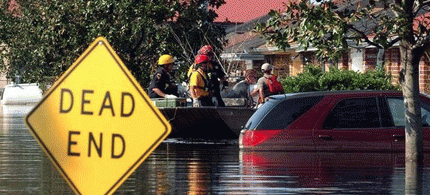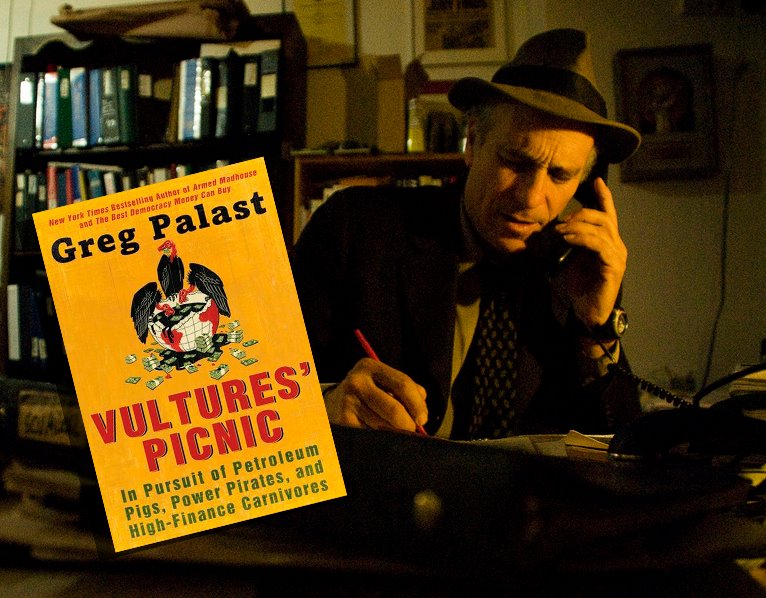Cross-posted from Reader Supported News

FEMA Urban Search and Rescue task forces search neighborhoods impacted by Hurricane Katrina.
(Image by (photo: FEMA)) Details DMCA
Nine years ago this week, New Orleans drowned. Don't you dare blame Mother Nature. Miss Katrina killed no one in this town. But it was a homicide, with nearly 2,000 dead victims. If not Katrina, who done it?
It wasn't an Act of God. It was an Act of Chevron. An Act of Exxon. An Act of Big Oil.
Take a look at these numbers dug out of Louisiana state records:
Conoco 3.3 million acres
Exxon Mobil 2.1 million acres
Chevron 2.7 million acres
Shell 1.3 million acres
These are the total acres of wetlands removed by just four oil companies over the past couple decades. If you're not a farmer, I'll translate this into urban-speak: that's 14,688 square miles drowned into the Gulf of Mexico.
Here's what happened. New Orleans used be to a long, swampy way from the Gulf of Mexico. Hurricanes and storm surges had to cross a protective mangrove forest nearly a hundred miles thick.
But then, a century ago, Standard Oil, Exxon's prior alias, began dragging drilling rigs, channeling pipelines, barge paths and tanker routes through what was once soft delta prairie grass. Most of those beautiful bayous you see on postcards are just scars, the cuts and wounds of drilling the prairie, once America's cattle-raising center. The bayous, filling with 'gators and shrimp, widened out and sank the coastline. Each year, oil operations drag the Gulf four miles closer to New Orleans.
Just one channel dug for Exxon's pleasure, the Mississippi River-Gulf Outlet ("MR-GO") was dubbed the Hurricane Highway by experts -- long before Katrina -- that invited the storm right up to -- and over -- the city's gates, the levees.
Without Big Oil's tree and prairie holocaust, "Katrina would have been a storm of no note," Professor Ivor van Heerden told me. Van Heerden, once Deputy Director of the Hurricane Center at Louisiana State University, is one of the planet's the leading experts on storm dynamics.
If they'd only left just 10% of the protective collar. They didn't.
Van Heerden was giving me a tour of the battle zone in the oil war. It was New Orleans' Lower Ninth Ward, which once held the largest concentration of African-American owned homes in America. Now it holds the largest contrition of African-American owned rubble.
We stood in front of a house, now years after Katrina, with an "X" spray-painted on the outside and "1 DEAD DOG," "1 CAT," the number 2 and "9/6" partly covered by a foreclosure notice.
The professor translated: "9/6" meant rescuers couldn't get to the house for eight days, so the "2" -- the couple that lived there -- must have paddled around with their pets until the rising waters pushed them against the ceiling and they suffocated, their gas-bloated corpses floating for a week.
In July 2005, Van Heerden told Channel 4 television of Britain that, "In a month, this city could be underwater." In one month, it was. Van Heerden had sounded the alarm for at least two years, even speaking to George Bush's White House about an emergency condition: with the Gulf closing in, the levees were 18 inches short. But the Army Corps of Engineers was busy with other rivers, the Tigris and Euphrates.
So, when those levees began to fail, the White House, hoping to avoid Federal responsibility, did not tell Louisiana's Governor Kathleen Blanco that the levees were breaking up. That Monday night, August 29, with the storm by-passing New Orleans, the Governor had stopped the city's evacuation. Van Heerden was with the governor at the State Emergency Center. He said, "By midnight on Monday the White House knew. But none of us knew."
So, the drownings began in earnest.
(Note: You can view every article as one long page if you sign up as an Advocate Member, or higher).





